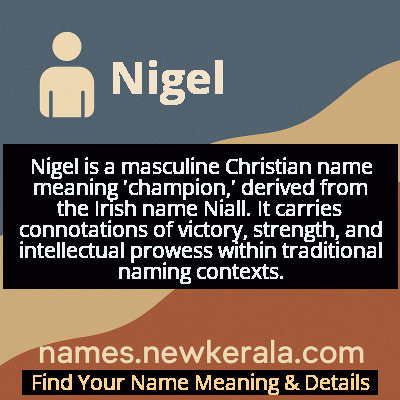Nigel Name Meaning & Details
Origin, Popularity, Numerology Analysis & Name Meaning of Nigel
Discover the origin, meaning, and cultural significance of the name NIGEL. Delve into its historical roots and explore the lasting impact it has had on communities and traditions.
Name
Nigel
Gender
Male
Origin
Christian
Lucky Number
2
Meaning of the Name - Nigel
Nigel is a masculine Christian name meaning 'champion,' derived from the Irish name Niall. It carries connotations of victory, strength, and intellectual prowess within traditional naming contexts.
Nigel - Complete Numerology Analysis
Your Numerology Number
Based on Pythagorean Numerology System
Ruling Planet
Moon
Positive Nature
Diplomatic, friendly, artistic, empathetic.
Negative Traits
Over-sensitive, moody, indecisive, prone to self-pity.
Lucky Colours
Green, cream, white.
Lucky Days
Monday.
Lucky Stones
Pearl, moonstone.
Harmony Numbers
1, 3, 4.
Best Suited Professions
Diplomats, mediators, caregivers, artists.
What People Like About You
Cooperative spirit, friendliness, artistic talent.
Famous People Named Nigel
Nigel Mansell
Racing Driver
1992 Formula One World Champion
Nigel Farage
Politician
Key figure in Brexit campaign
Nigel Kennedy
Violinist
Renowned classical violinist
Nigel Barker
Photographer
Judge on America's Next Top Model
Name Variations & International Equivalents
Click on blue names to explore their detailed meanings. Gray names with will be available soon.
Cultural & Historical Significance
Extended Personality Analysis
People named Nigel are commonly associated with characteristics of intelligence, reliability, and refined manners. They tend to be perceived as thoughtful individuals who approach life with careful consideration and analytical precision. This name often suggests someone who values tradition and order, yet possesses the intellectual flexibility to adapt to changing circumstances. Nigels are typically seen as dependable friends and colleagues who maintain their composure under pressure and offer wise counsel when needed. Their communication style often features dry humor and understatement, reflecting a typically British sensibility that prizes wit over overt emotion. While sometimes viewed as reserved or formal in initial encounters, those who know them well appreciate their loyalty and depth of character. The combination of traditional values with intellectual curiosity makes Nigels particularly well-suited for professions requiring both analytical thinking and interpersonal sensitivity, from academia to business leadership.
Modern Usage & Popularity
In contemporary naming practices, Nigel has experienced a significant decline in popularity, particularly since the late 20th century. Once a common choice in the UK during the mid-1900s, the name now carries somewhat dated connotations and is rarely given to newborns. Current usage trends show it maintaining a niche appeal among parents seeking traditional British names with intellectual associations, though it faces competition from more modern alternatives. The name's strongest presence remains in the United Kingdom and Commonwealth countries, where it retains cultural recognition despite its fading popularity. Demographic data indicates that most contemporary Nigels are middle-aged or older, contributing to the name's perception as traditional rather than trendy. However, this very rarity may eventually contribute to a revival among parents looking for distinctive classic names that stand apart from current naming fashions.
Symbolic & Spiritual Meanings
Symbolically, Nigel represents the enduring values of intellect, tradition, and quiet strength. The name evokes the metaphorical journey from ancient warrior traditions to modern intellectual achievement, symbolizing the transformation of physical courage into mental fortitude. As a name derived from 'champion,' it carries connotations of victory through perseverance and strategic thinking rather than brute force. Nigel also symbolizes British cultural identity in its most refined form - embodying qualities of reserve, dry humor, and understated confidence. The name suggests someone who wins respect through competence and integrity rather than flashy displays of talent. In a broader sense, Nigel represents the bridge between historical legacy and contemporary relevance, maintaining traditional values while adapting to modern contexts. This symbolic richness makes the name carry weight beyond its simple phonetic qualities, connecting the bearer to centuries of cultural and intellectual tradition.

